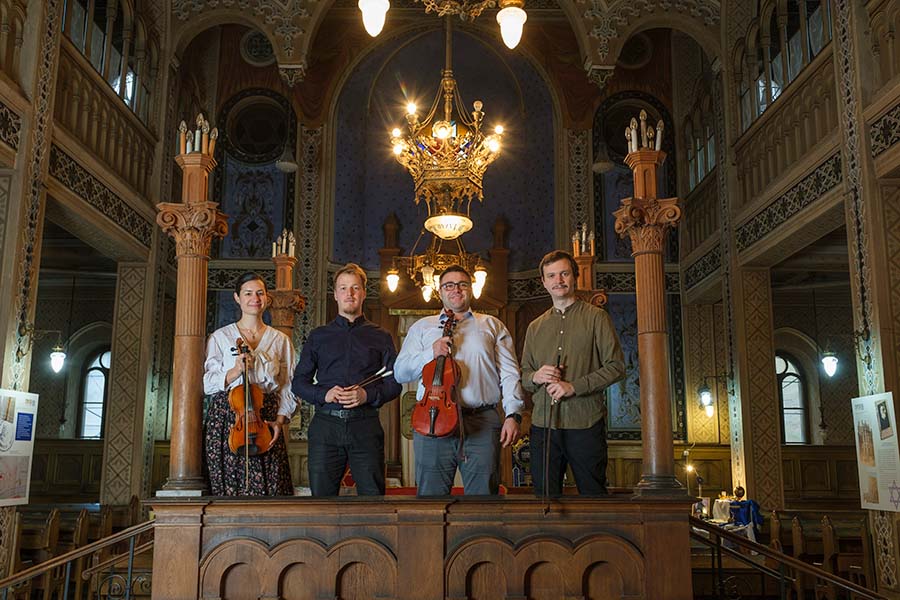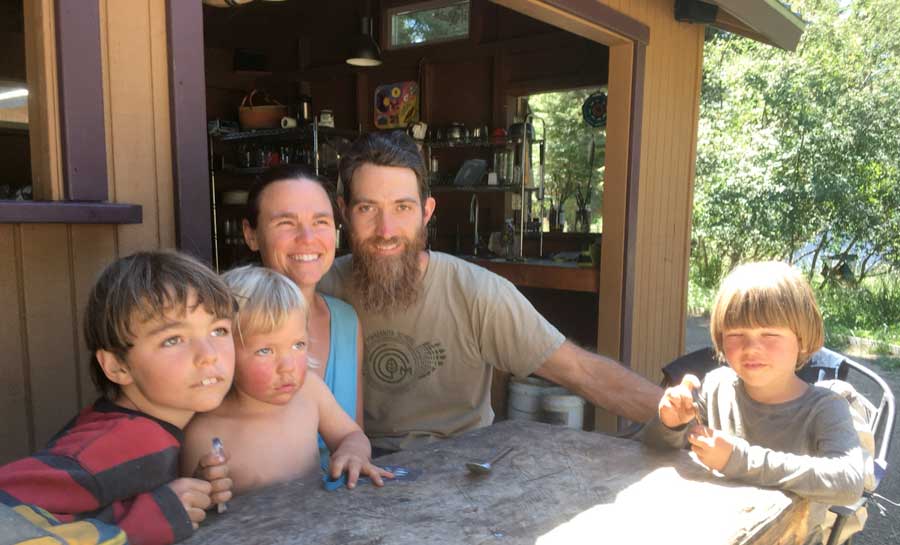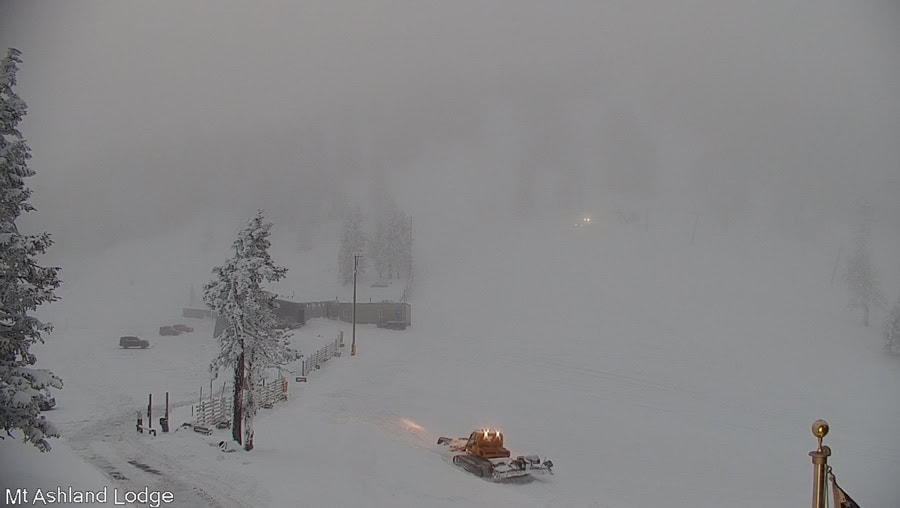‘Producing in rotating rep is like an elaborate dance,’ says Kaytlin McIntyre, who will help bring the musical ‘Come From Away’ to the Bowmer Theatre stage next season
By Jim Flint
When Oregon Shakespeare Festival producer Kaytlin McIntyre describes her job, she doesn’t reach for glamor.
“I often describe my job as artistic operations,” she said. “I make sure that artists have what they need to be successful, help resolve conflict when it arises, and serve as a communication vector between the show and administrative staff at the festival.”
That mix of diplomacy, logistics, and artistry defines McIntyre’s world at OSF, where she’s preparing to produce next season’s musical production, “Come From Away.” The Tony-nominated show is a portrait of generosity set in the tense days after 9/11 — and McIntyre believes its spirit of human connection couldn’t land in a more fitting place than Ashland.
“I think this show has particular resonance in Ashland,” she said. “This community knows firsthand what it means to come together and support your neighbors in the face of an unexpected tragedy.”

A Kansas City girl
Now 37 and settled in Ashland with her husband and their dog, McIntyre grew up outside Kansas City. Her parents weren’t artists by trade. Her mother worked in a grocery store, her father installed glass in buildings. But she says both “are very creative in their day-to-day lives,” which taught her early on that “creativity — be it professional, amateur, or domestic — is a fundamental part of what brings joy and meaning to our lives.”
That ethos carried her through a teenage “aha” moment in a public-school drama program.
“My theater teacher, Mr. Dougherty, inspired my love of collaboration and self-expression through theater,” she said. “His primary mission was to keep kids out of trouble and give them somewhere productive to go after school, but he gave me a lot of opportunities to be a leader in our drama club.”
When her interest in acting waned, he opened the doors to directing, writing and producing — the path that would become her calling.
She earned her BFA in directing from the Conservatory of Theatre Arts at Webster University in St. Louis, then embarked on a decade-long rise at Seattle Repertory Theater. Starting as an intern, she eventually became the artistic producer, overseeing casting, new-play development and creative producing.
“Working in so many different capacities made me more knowledgeable about different aspects of theater,” she said, “and better able to understand the distinct challenges that each artist and department may be facing.”
A balancing act
At OSF, McIntyre carries the title director of repertory producing — a mouthful that translates to orchestrating multiple productions running in rotating repertory, the festival’s hallmark.
“Producing in rotating rep is like an elaborate dance,” she said. “If someone goes out of step it can set off a chain reaction throughout the company. Part of my job is to build a safety net so the house of cards doesn’t fall if one card comes out of place.”
Her days are fluid: “During rehearsals, I’ll often stop by to say hello and check the temperature of the room,” she said. “Sometimes I’ll offer artistic feedback to the creative team, make sure communication is flowing to musicians, designers and production staff as we enter technical rehearsals — and generally try to be of service to the production in whatever way it needs to ensure the artistic excellence of the work.”
That hands-on vigilance extends to the numbers.
“I oversee the artistic budget, so if there’s an expense that is not accounted for, it’s up to me to approve that additional expense,” she explained. “I believe a budget is a reflection of your values, so it’s important to me that our budget is an accurate reflection of the vision and mission of OSF. For me, the artistic and financial are interchangeable.”
A story that feels like home
“Come From Away” recounts the true story of Gander, Newfoundland, in the days following Sept. 11, 2001. When U.S. airspace was closed, 38 planes carrying 6,579 passengers were diverted there as part of Canada’s Operation Yellow Ribbon. For five days, the town’s 10,000 residents opened their homes, schools and churches to the stranded travelers, offering food, shelter and kindness. The musical celebrates Gander’s extraordinary generosity and humanity amid the global tragedy.
Toronto lawyer and producer Michael Rubinoff conceived “Come From Away.” He enlisted David Hein and Irene Sankoff to write it after interviewing real Gander residents. Workshopped in Ontario, the musical opened on Broadway in 2017, earning seven Tony nominations and becoming Broadway’s longest-running Canadian show.
McIntyre’s connection to the show runs deep.
“I was working at Seattle Rep during the world premiere of ‘Come From Away’ in a co-production with La Jolla Playhouse, so I have a long history with the show and its particular magic,” she said. “Coincidentally, Justin Huertas and Kiki deLohr, who will be in the production at OSF, were in the original workshop of the show at Seattle Rep.”
She draws a straight line between Gander’s compassion and the Rogue Valley’s own crisis-tested community spirit.
“There’s a wonderful scene in ‘Come From Away’ where a few of the local women in Gander start cooking and gathering supplies because ‘I can’t watch the news anymore,’ and it feels almost identical to the stories I’ve heard about individuals and organizations who stepped up throughout the Rogue Valley to provide aid, shelter and support during the wildfires.”
Keeping it fresh
Unlike most regional musicals that run a few weeks, OSF’s “Come From Away” will play for seven months, a logistical marathon.
“I anticipate the biggest challenge will be to maintain the show for the full length of the run and make sure that patrons who visit at the end of the season in October have just as magical of an experience as patrons who attend opening night,” she said. “A lot can happen in seven months, and our role is to support our performers and stage managers and work with them to problem-solve any challenges that arise throughout the season.”
Yet she sees equal measure of joy in that endurance test.
“We have a fantastic company of actors,” she said. “One of my favorite parts about working here is getting to see familiar artists do roles that are wildly different from each other or show off skills that they haven’t gotten to show before. In ‘Come From Away,’ we have great Shakespeare actors who will be stretching their musical legs.”
She added, “I’m excited to see a version of the show that has the foundation of text, voice and physical craft that Shakespeare training brings.”
All in sync
McIntyre talks about theater as a living ecosystem.
“Theater is a team sport — it’s the most collaborative art form, and a successful show at OSF will often require dozens, if not hundreds, of people to be operating in seamless coordination,” she said. “Whether you’ve known someone for 30 years or just met them that day, it’s vital that we build a foundation of trust and understand that we’re all part of a much bigger machine.”
Her producing philosophy leans on transparency and empathy — traits she credits to her time as both a director and a casting director.
“Coming into a new institution as a freelance artist, you spend a lot of time and energy trying to understand who does what or how systems work,” she said. “As a producer I try to arm our artists with information, facilitate clear communication and make myself a resource for questions and problem-solving. My goal is always to relieve artists of logistics so they can focus on making great art.”
Guiding new voices
McIntyre’s teaching résumé includes the University of Washington, Cornish College of the Arts, University of Puget Sound and her alma mater, Webster University.
“I love teaching undergraduates, especially non-theater majors,” she said. “Often you’re working with students who are there because of curiosity or just because they want to have fun expressing themselves.”
That sense of play informs her leadership style.
“Usually, they don’t know much about the industry or the difficulties of ‘making it,’ and so there’s an openness and freedom to their performances because the stakes are low,” she said. “Taking risks and finding joy in the work is vital to making it sustainable long term.”
Nature and nurture
When McIntyre isn’t managing rehearsal schedules, she’s exploring the trails around Ashland.
“My husband and I have always dreamed about living in a cabin in the woods,” she said. “I never thought I would get to see that reality while I worked in theater, as theaters tend to be in urban areas. Enter Ashland, Oregon!”
“The outdoors is very grounding,” she said. “It gives me perspective and peace, and allows me to appreciate the natural beauty that is all around us. It’s a particular magic to watch a show in the Elizabethan with a clear night sky and the crickets chirping, or to walk out of the Thomas Theatre after a matinee and be greeted by a panoramic view of the mountains. It’s an immersive experience.”
Looking ahead
McIntyre says the future of OSF’s repertory seasons will hinge on shows that engage the heart and the intellect equally.
“I’m most excited by the shows that offer both entertainment and big ideas to chew on,” she said. “Delight and joy are critical to bringing an audience in — they open up your pores so the deeper idea has greater impact.”
She’s betting “Come From Away” will do just that.
“We have a few shows in our next season — and beyond — that provide spectacle and humor and also have something important to say,” she said.
For McIntyre, that blend — craft, compassion and community — is the sweet spot where theater lives.
“Creativity,” she said simply, “is what brings joy and meaning to our lives.”
For more information about “Come From Away” and other 2026 OSF productions, or to purchase tickets, visit osfashland.org. Early access to tickets for members began Nov. 4. Sales to the general public begin Dec. 2.
Jim Flint’s Curtain Call column publishes on the second and fourth Mondays of the month. Email Jim at [email protected].
Nov. 11: Sub-headline corrected to say “Come From Away” will be on the Angus Bowmer Theatre, not Allen Elizabethan Theatre, stage.



















